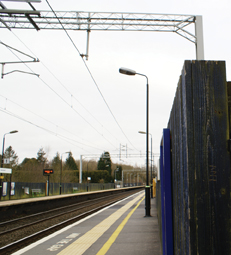What makes passengers feel safe or unsafe at rail stations and on trains? That matters for a number of reasons to various, security and other, people.
We featured in January a senior British Transport Police (BTP) officer promising to get stricter with football-related trouble on trains. Crime and anti-social behaviour on the railways matters because it might put travellers off using trains again – bad for business; and it makes the work of railway staff harder. While the cynic might answer that it brings work for security people, it’s important for security practitioners to know what passengers think, and what bothers them, so that security measures are worthwhile. Hence in May a report by the watchdog Transport Focus, titled ‘Passenger perceptions of personal security on the railway’. Passengers rate being able to see staff; or put another way, they feel concerned when staff aren’t in sight. While those staff also need to be approachable, it suggests that technology alone – such as CCTV, or better lighting on platforms and car parks – won’t combat crime, or fear of crime, by itself.
The watchdog does have a good news story to tell; passengers they survey feel more satisfied about security than last decade. That said, frequent travellers and those in London and its commuter belt are least satisfied about their personal security, on trains and on stations. Rowdies and drunks, or even merely people playing music loudly or putting their feet up on seats – that is, the sort of low-level trouble that seldom gets recorded, but worries people – are cited in the surveys (which also seems true for buses). The first fear is of being robbed; and while common sense might say that older people fear youths, in fact if anything the elderly are more satisfied with their personal security, and the youngest travellers fear being assaulted (albeit maybe by other youths).
The watchdog’s study went on to what train operators are doing. It’s very much a case of not wanting to re-invent the wheel; and some ideas can work on the railways that apply elsewhere. In London, CitySafe is a scheme whereby shops and public buildings offer themselves as a haven, and have signage to that effect. Why bother with feet on seats? It comes with a cost, if those seats need cleaning. Hence Merseyrail had its guarding contractor Carlisle Security enforce a bye-law against feet on seats. Patrollers with body-cams take footage of offenders, and first-time offenders can get away with paying an admin charge of £50. That – and posters – sends a message that wrong-doing will be punished. Another issue with a non-security angle is passengers unfit to travel (after drinking, for instance). That brings a safety risk also, such as falls on escalators. Again, Merseyrail ran a publicity campaign setting out what it expects of customers; and if rail staff feel an unfit passenger is being abusive, they can fall back on the Carlisle officer. Since 2014, Merseyrail has banned open carrying and drinking of alcohol on its services. Again, that is not original – Scotrail bans alcohol after 9pm, and even Eurostar brought in drinks bans for the Euro 2016 football championships in France. As the report sets out, particular problems tackled have been offshore workers drinking on trains taking them home from Aberdeen; and ‘hens and stags’ on northern trains. As the watchdog points out, anti-alcohol bans need to be enforced, or they don’t deter. Once drunks are on trains, staff may allow passengers who feel threatened to move to another carriage, which as the report says only mitigates the problem, rather than solving it. “Dry’ trains should be well communicated, the watchdog adds.
Just as it’s striking how rail security does not happen in isolation – those drunk trouble-makers on a Saturday night may well have been to races, football matches or on a night out in pubs – so a security measure cannot work in isolation. As the watchdog says, ‘it is not a question of just providing more bodies on the ground’; security and rail staff need to be trained, to enforce rules, yet not be too zealous. The report gives the example of London Overground; after 8pm the regular rail staff clock off and security staff come on; they have the same training as regular staff, and the same uniform except for a different name badge, so they can answer traveller queries about journeys. Interestingly, the study touches on whether to outsource (it speaks of one, unnamed, train operator that has brought cleaners in-house and trained them to make them feel more like they belonged) and who to recruit (London Overground seeks to recruit locally, whereas some operators feel it’s better that non-locals check tickets).
The report is also alive to how difficult it can be to provide security after dark; passengers want staff on a station so long as trains are calling there, but doesn’t that merely create the risk of a lone worker faced with youths handing around? Retail at or near a station might create ‘natural surveillance’ and reassurance for travellers waiting for a train; but would a shop open also attract loiterers?! As for CCTV, the watchdog raises concerns that amount and usage differs between rail operators, and there’s a lack of integration between local government and railway CCTV systems. Technology is developing; for instance, the report suggests automatic tracking of people, using facial recognition software; and live streaming of in-train CCTV for monitoring when an emergency alarm is activated. The dilemma is that while the quietest stations are least likely to get CCTV and a security spend, they are the very places passengers might feel uneasy at.









